What would you like to know about the Eastern Orthodox Christian faith? Submit your question.
I was raised a Protestant, but as I study, I am finding major problems. Particularly with eschatology interpretations. I am very interested in finding the earliest Eastern Orthodox commentary on the entire Bible written in English. Can you make a recommendation?
The Orthodox Study Bible (OSB) is the best English translation of the scriptures. The New Testament (NT) of the OSB is primarily the New King James version, and the Old Testament (OT) of the OSB is the Septuagint version. You will find footnotes that are easy to understand, special sections on eschatology and discover, by reading the commentaries, the “holistic” nature of the Orthodox faith. The Orthodox Church is a scriptural church that has never altered, subtracted from, or added to, any part of the Bible, its faith or its holy traditions.
The Orthodox Church is the ancient church established by Christ and the Apostles. In A.D. 325, at the council of Nicaea, 318 bishops of the known Christian world gathered to determine which books would be declared the Word of God. They assembled what we know today as the Bible, containing 27 books of the NT and 49 books of the OT Septuagint.
The Septuagint OT was translated from Hebrew, Aramaic and several other languages into the high-level ancient Koine Greek in about 200 B.C. It was very much in use at the time of Christ and considered by the Jews to be divinely inspired. The Septuagint was used and referenced by Christ and the Apostles as it is today by the Orthodox and Roman Catholic Churches.
In and around A.D. 90, at what is referred to as the Jewish Council of Jamnia, the Jews, in an attempt to curb the many conversions to Christianity, began altering some of their scripture and discarding a number of Septuagint books as non-canonical. Some of those altered Hebrew texts were changed to disprove Christ as the Messiah, the Crucifixion, the validity of the virgin birth and other prophecies.
Around the 9th century, a group of Jews called the Masoretes transcribed these altered Hebrew texts, which became known as the Masoretic OT. At the beginning of the Protestant reformation around the 16th century, Protestants chose to follow Luther’s lead to replace the original Septuagint OT with the Masoretic OT of only 39 books.
The majority of Christians since the time of Christ have used the Septuagint. Of approximately 350 quotes in the NT, about 300 of them are direct word for word from the Septuagint. Only six times out of the 350 quotes does the NT agree with the Masoretic over the Septuagint. In addition, the NT makes quite a few quotes and allusions to books of the Septuagint, which the Masoretic does not even contain.
The recent discovery of the Dead Sea Scrolls, which were written in Hebrew, consistently agrees with the Septuagint OT over the Masoretic OT.
For a more of a complete understanding of why the Septuagint OT is the more accurate and official part of the Bible, tap on this YouTube link. It is only only a five-minute video if you’d like to learn more.









